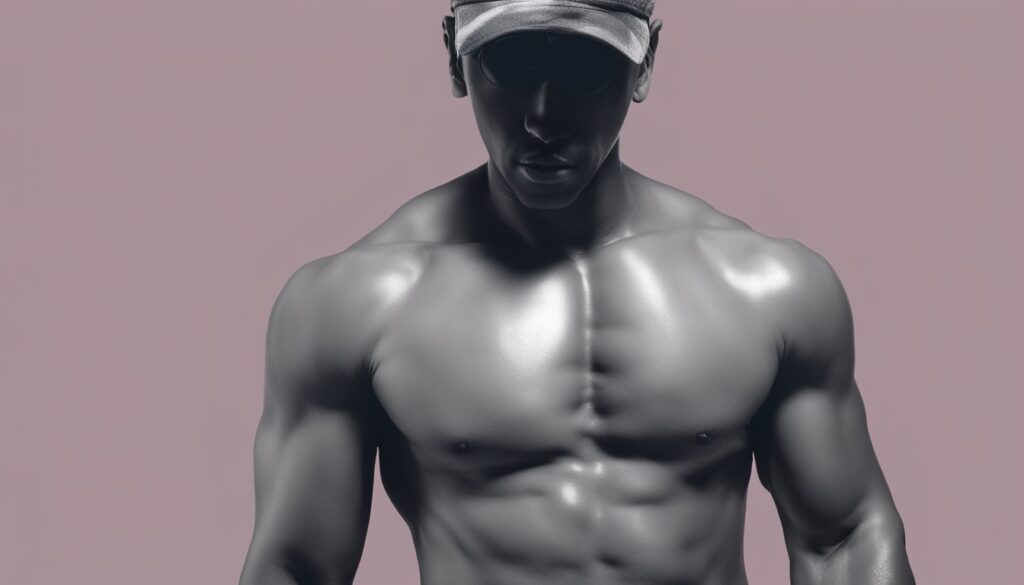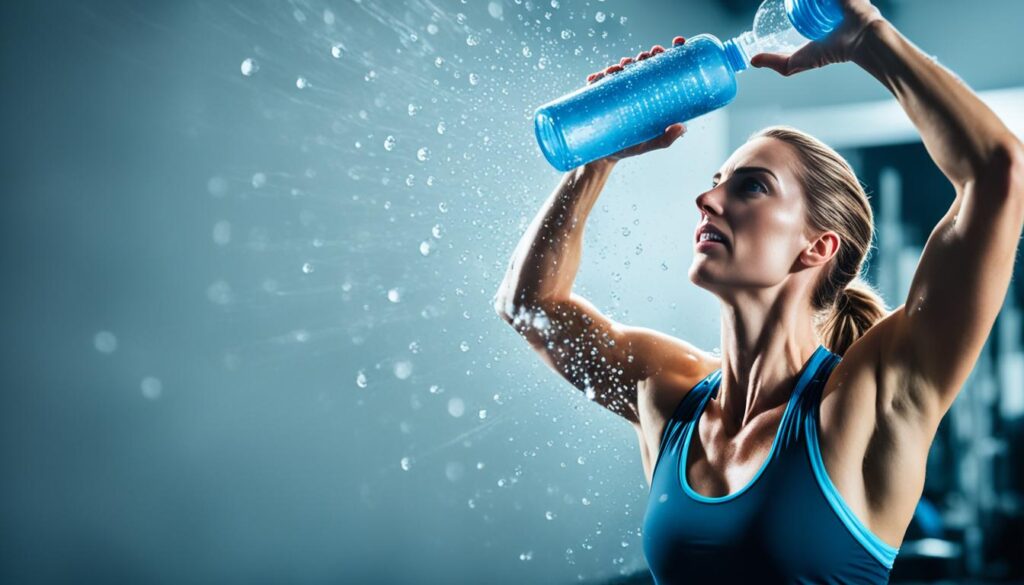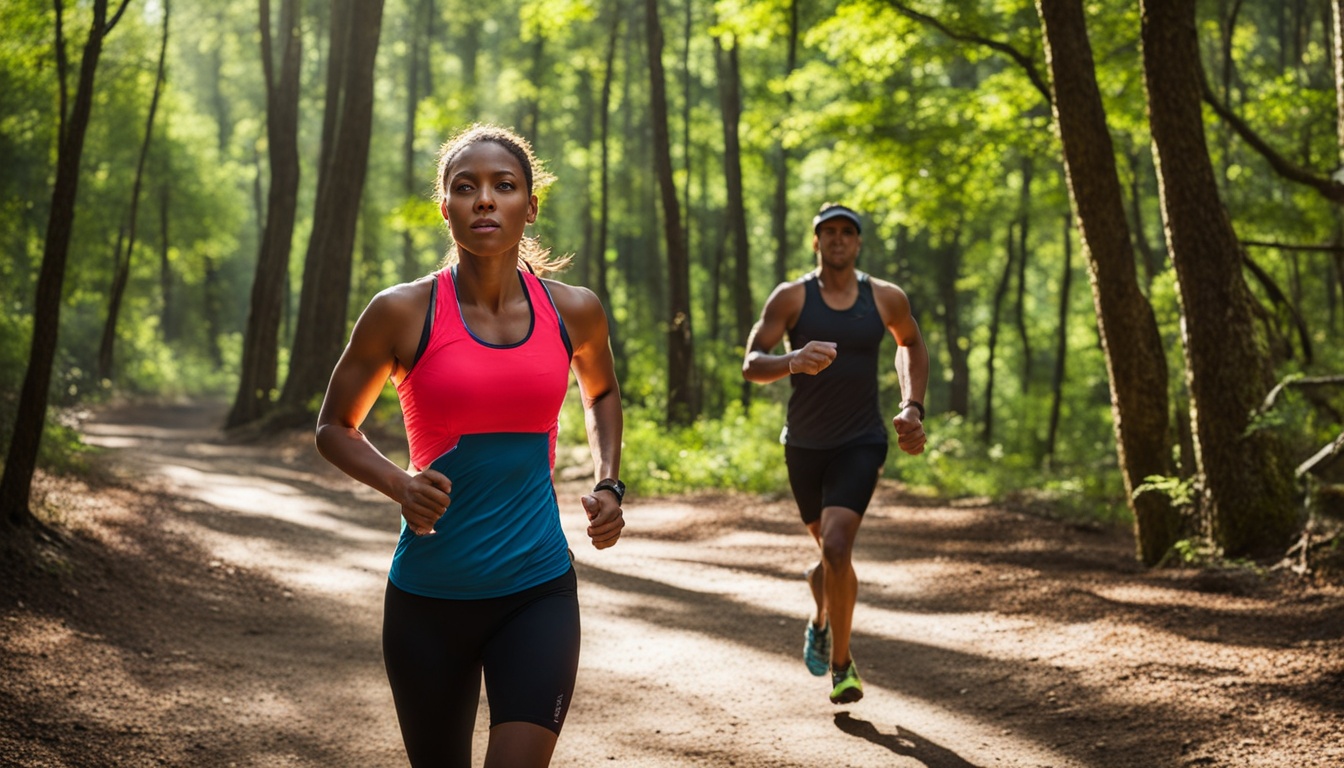Staying hydrated is super important for people who exercise regularly. Since our bodies are mostly water, staying hydrated aids all our systems. It’s especially needed for muscles, the heart, and our brain1. So, drinking water during workouts is key.
Water helps with many vital things, like moving nutrients around and keeping our blood pressure steady. It’s also key for turning food into the energy our bodies need1. The Institute of Medicine suggests women drink around 91 ounces (11 cups) a day. For men, they recommend about 125 ounces (15 cups)2. Following these hydration rules isn’t just good for health; it’s also crucial for top sports performance.
If you’re an athlete, watching your water intake is crucial. Athletes should sip on 4 to 8 ounces every 15 to 20 minutes when working out2. It’s critical for their performance.
Older athletes face more risks from dehydration and heat sickness because their bodies change2. That’s why having a smart hydration plan that fits your sport is so important.
Importance of Hydration During Exercise
Hydration is key for top performance in any physical pursuit. It aids in moving nutrients, controlling body temperature, and handling energy well.
Benefits of Proper Hydration
Being well-hydrated boosts how well you can work out over time, as well as in quick bursts. It helps get nutrients and oxygen to your muscles, keeping you energized. This also means your muscles work better, and you stay flexible, fast, and strong3. Without enough fluids, athletic abilities drop, and even key minerals like potassium, calcium, and magnesium suffer3.
Risks of Dehydration
Not drinking enough water harms your performance and health, bringing on issues like heat stroke and kidney problems. In a workout, you can shed up to 2-3 quarts an hour, especially in long runs or tough rides3. This leads to dizziness, cramps, and thirst, which are warnings to hydrate4. If dehydration gets bad, it can hurt your mind and body severely, needing quick help435.
How Water Supports Physical Performance
The American Council on Exercise advises 17 to 20 ounces of water a few hours before working out4. Then, sip 7 to 10 ounces every 10-20 minutes during exercise to stay at your best4. Finally, drink 16 to 24 ounces for every pound you lose through sweating4. This step makes sure you’re not only at your peak but also helps your body adapt to training5.
Understanding hydration’s importance is crucial. It prevents dehydration and aids peak physical performance. By following these suggested hydration tips, athletes stay strong, quick, and healthy.
Signs of Dehydration and Overhydration
It’s important to notice the signs of dehydration and overhydration. This helps us perform our best, especially when we exercise. We should maintain the right balance when drinking water.
Common Symptoms of Dehydration
Dehydration shows in various ways, from light to severe. Look out for feelings of dizziness, nausea, and having muscle cramps. Even if you lose just 2% of your body’s fluids, you could see a big drop in your sports performance, up to 20%. It’s crucial to keep hydrated6.
Athletes might not fully recover their water levels between exercises or competitions, starting in a less hydrated state. This can lower the quality of their training and even raise stress levels5. Spotting the signs of dehydration early is key. This allows you to tackle the issue before it affects you too much.

Understanding Overhydration and Its Symptoms
Drinking enough water is vital, but we must also avoid overhydration. This can lead to hyponatremia, where excess water lowers sodium levels. This causes problems like confusion, headaches, and, in serious cases, fainting. Remember, the body can only process up to about 500 milliliters of water per hour. This shows why we shouldn’t drink too much at once during our exercises or games6.
Choosing to drink water while training can make your body better at handling water later, such as during a competition5. Making sure you get the right mix of electrolytes is important for preventing overhydration, especially for long-distance athletes6.
Water and Exercise: Staying Hydrated During Workouts
It’s vital to follow expert advice for staying hydrated while exercising. Drinking water during your workout is key. It keeps you performing at your best and avoids dehydration.

To hydrate before exercising, aim for 17 to 20 ounces of water a few hours ahead4. Then, have 8 ounces 20 to 30 minutes before you start to ensure you’re well-hydrated to begin4.
While working out, sip 7 to 10 ounces every 10 to 20 minutes to stay hydrated4. This helps replace fluids lost through sweat, which can also mean losing salts. For intense workouts over an hour, consider sports drinks to recover electrolytes4.
After exercise, rehydration is crucial for recovery. Experts recommend drinking 16 to 24 ounces for every pound lost during the workout4. This step is critical to replace lost fluids and aid in muscle and fluid balance7.
Customizing your hydration plan is key. It should fit your needs based on how much you sweat, the weather, and your body’s unique system. This ensures you’re well-hydrated to perform your best and stay healthy.
| Timing | Water Intake | Notes |
|---|---|---|
| 2 to 3 hours before exercise | 17 to 20 ounces | Ensures starting hydration4 |
| 20 to 30 minutes before exercise | 8 ounces | Prepares body for exertion4 |
| Every 10 to 20 minutes during exercise | 7 to 10 ounces | Maintains fluid levels4 |
| Post-workout | 16 to 24 ounces per pound lost | Replenishes lost fluids4 |
How Much Water to Drink Before, During, and After Exercise
Staying hydrated is key for both your workout and your health. It’s critical to drink the right amount of water before, during, and after physical activities to steer clear of dehydration. Check out these hydration guidelines for better performance.
Pre-Workout Hydration Tips
Hydrating before you start is a must. The American Council on Exercise advises you to drink 17 to 20 ounces of water about 2-3 hours before your workout4. Also, sip 8 ounces of water around 20-30 minutes pre-exercise, or during your warm-up, to prepare your body4. Good pre-workout hydration helps nutrients flow and boosts your workout.
Hydration During Exercise
Keeping up with water during your workout is crucial, especially for long or intense ones. It’s good to drink 7 to 10 ounces every 10 to 20 minutes during exercise4. For exercises lasting more than an hour, a sports drink can fill you with needed calories, potassium, and electrolytes4. These steps keep your energy up and prevent dehydration.
Post-Workout Hydration Guidelines
After your sweat session, refueling with fluids is vital. Downing 8 ounces of water within the first half-hour of stopping your exercise aids in recovery4. Also, for every pound you shed during exercise, aim to drink 16 to 24 ounces of water to rebalance your body’s fluids4. Tailoring your post-workout hydration plan can boost your recovery and next workout’s performance.
FAQ
Why is staying hydrated during workouts important?
What are the benefits of proper hydration during exercise?
What are the risks of dehydration during workouts?
How can staying hydrated prevent dehydration during exercise?
What are the common symptoms of dehydration?
What is overhydration and what are its symptoms?
What are the best practices for hydration during exercise?
How much water should one drink before a workout?
What hydration guidelines should be followed during exercise?
What are the post-workout hydration guidelines?
Source Links
- https://www.health.com/fitness/hydration-and-exercise-how-to-get-it-right
- https://www.massgeneralbrigham.org/en/about/newsroom/articles/tips-for-staying-hydrated
- https://www.hopkinsmedicine.org/health/wellness-and-prevention/nutrition-and-fitness/sports-and-hydration-for-athletes
- https://familydoctor.org/athletes-the-importance-of-good-hydration/
- https://pubmed.ncbi.nlm.nih.gov/23899752/
- https://www.bannerhealth.com/healthcareblog/advise-me/why-dehydration-can-crush-any-workout–and-how-to-fight-it
- https://www.onepeloton.com/blog/best-way-to-hydrate/




